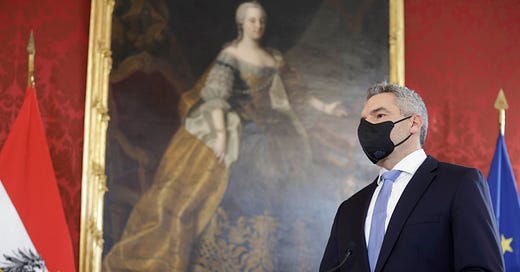Saints and Sinners
Another week, another crisis of party and government as Karl Nehammer replaced Alexander Schallenberg as chancellor and Sebastian Kurz as ÖVP leader
Servus!
As he announced his intention to withdraw from political life and give up the chairmanship of the People’s Party (ÖVP) at an unexpected press conference shortly after 11.30 am on Thursday, former chancellor Sebastian Kurz uttered the words: “I am neither a saint nor a criminal.” A most unfortunate choice of words, one might say, reminding the country as they did of why Kurz had resigned the chancellorship two months ago, fading thereafter into the political background. From this, one can deduce that Kurz either had not heard of or simply paid no heed to the Streisand effect,
Kurz opined he was tired of the feeling of being “hunted.” Indeed, anti-corruption authorities continue their investigations not only into whether state funds were used to pay for sexed-up opinion polling then published in a friendly newspaper, but also whether Kurz provided false statements to a parliamentary investigative committee looking into the Ibiza affair and if there were ties financial or political between his People’s Party (ÖVP), the international gambling giant Novomatic, and the partly state-owned casinos operator Casinos Austria. The presumption of innocence applies.
In October, Kurz became the youngest ex-chancellor in the history of the republic. Now, the first act of his political career is at an end. His rise was swift: secretary of state for integration at 25; foreign minister at 27; chancellor at 31. But like Icarus ascending, Kurz flew too close to the sun and fell down ungracefully from the heights to which he’d ascended by dint of his own hubris. His tangible political legacy is thin: cuts to income and corporation tax, the new family tax credit, and—to his credit—important steps towards Austria coming to terms with its Nazi past. As I wrote in more detail for the New Statesman, his promise of a new style of politics turned out to be an entirely empty one.
By Thursday’s end, it would not only be the ÖVP that would require a new leader. That evening, chancellor Alexander Schallenberg—the ex-foreign minister who only became chancellor on October 11 following Kurz’s resignation—declared his readiness to give up his job in favor of whomever the ÖVP chose to lead it. With Kurz out of the picture, this peculiar arrangement born out of political necessity whereby the roles of chancellor and party leader were occupied by two different people no longer made any sense. Since he had no desire to lead the ÖVP, Schallenberg said, he would dutifully step aside.
Thank you for signing up to the Vienna Briefing. If you know someone who would be interested in receiving this newsletter, consider sharing it with them today.
The following morning, the ÖVP’s executive committee gathered in person to choose its new leader and Austria’s next chancellor. While a handful of names circulated in the press, including the current minister for the EU and the constitution Karoline Edtstadler, the committee speedily and unanimously settled on interior minister Karl Nehammer. Not only was Nehammer a man of the party—former party general secretary; active in the ÖAAB, the ÖVP’s workers’ organization—he had the support of Johanna Mikl-Leitner, the former interior minister and current governor of Lower Austria.
Following the Kurz era during which power became incredibly centralized, gathered around Kurz and a few close associates, Nehammer’s appointment was one instance of the governors of Austria’s ÖVP-run states reasserting their authority over the party. Another was the simultaneous cabinet reshuffle. Gernot Blümel, Kurz’s confidant who also finds himself in the anti-corruption authorities’ headlights, left the finance ministry; education minister Heinz Faßmann—who’d fallen out with the governors over school closures during the pandemic—was ousted.
Their replacements were touted as Nehammer’s picks, but the governors’ imprint on the reshuffle is evident. Care was taken to make sure each state had a representative in government. The new finance minister Magnus Brunner is from Vorarlberg, the education minister Martin Polaschek is from Styria, the interior minister Gerhard Karner is from Lower Austria, and the secretary of state for youth Claudia Plakolm is from Upper Austria. While economy minister Margarete Schramböck’s head was said to have been on the chopping block, she had the protection and patronage of Tyrol’s governor, Günther Platter.
On Monday, Schallenberg was formally relieved of his duties, having been chancellor for just 56 days, and Nehammer was sworn in by president Alexander Van der Bellen. A crisis of party, which had become a crisis of government, had been brought to a close, but the ÖVP-Green coalition—struggling as it is against the pandemic’s fourth wave and polarized by divergent agendas on immigration and the environment—is weak. The opposition, from the far-right Freedom Party (FPÖ) to the liberal NEOS, continues to call for new elections. For now, both the ÖVP and the Greens wish to battle on: first, to get to the other side of the fourth wave; second, to chalk up some post-reshuffle achievements. And in any case, the late spring or early summer—when COVID-19 case numbers will be far lower than they are now—would be a far more suitable environment in which hold new parliamentary elections.
Bis bald!




